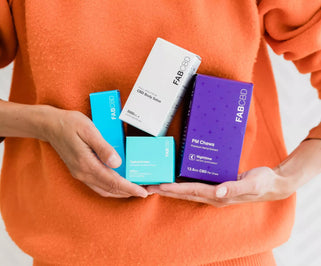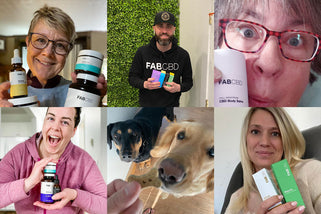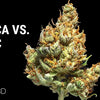If you’re new to CBD, it’s easy to get confused with all of the different types of products, CBD varieties and strengths, and CBD-related terminology that’s out there. It can get confusing when it comes to figuring out what the difference is between CBD oil and hemp seed oil. The first thing you should know is that hemp seed oil has been around for quite some time, while CBD oil is fairly new. In general, there is a lot of misleading labeling that happens when the two are placed side by side. The good news is that we’re here to help you discover the important differences between CBD oil and hemp oil.
CBD Oil vs Hemp Seed Oil: What’s the Big Difference?
CBD oil and hemp seed oil are both in the same cannabis family, however, they are sometimes wrongly marketed as being one and the same. While both are extracted from the hemp plant, they have different properties. Hemp seed oil will be listed as cannabis sativa seed oil, while CBD oil will be listed as cannabidiol, full-spectrum hemp, broad-spectrum hemp, CBD isolate, or hemp oil/extract.
There are basically three main differences between CBD oil and hemp seed oil. These are:
-
Hemp Seed Oil and CBD Oil are Used Differently. While both can be either used as a topical or taken internally, the reality is that hemp seed oil tends to be added to foods or topical creams much in the same way as olive oil or coconut oil. Hemp seed oil contains a wealth of vitamins, minerals, and omega fatty acids, as well as some nutritional benefits. Hemp seed oil is also packed with omega-3 and omega-6 fatty acids which can help boost health in a number of different ways. However, hemp seed oils also do not contain much or any CBD.
On the other hand, CBD, or cannabidiol, is one of the over 100 compounds in the hemp and marijuana plants. It is a chemical compound extracted from the cannabis sativa plant and added to tinctures/oils or other products specifically so that the body’s endocannabinoid system can engage with this active ingredient. True CBD oils will contain high quantities of CBD, whereas the CBD in hemp seed oils is either very minimal or completely non-existent. - Hemp Oil and CBD Oil are Not Created the Same Way. There is a big difference in the way the hemp seed oil and CBD oil are processed. For example, hemp seed oil is cold-pressed just from the cannabis sativa seeds to create an oil that is thick, dark, and that is highly concentrated and bursting with nutrients. Conversely, CBD oil is extracted from the stalks, leaves and flowers of the hemp plant using many different processes like the industry preferred clean CO2 extraction process. The end results of this type of extraction leaves extracts that contain beneficial cannabinoids, terpenes, and phytonutrients.
- Hemp Oil and CBD Oil are Seen Very Differently by the FDA. Hemp seed oil is clear and legal in the eyes of the Food and Drug Administration (FDA), and it can be sold and purchased anywhere. However, the laws are a bit different when it comes to CBD oil. According to the 2018 Farm Bill, only hemp-derived CBD oils that contain 0.3% or less THC are legal across the United States. Thankfully, the hemp plant is specifically bred to contain very low levels of THC.

How CBD Oil and Hemp Seed Oil are Made
Hemp seed oil and CBD oil are made in two different ways. When hemp seed oil is created, it's extracted from the seeds of the hemp plant. And because the oil comes from hemp seeds and not from the flowers, stems, or leaves of the plant, the resulting oil does not have any THC in it. Hemp seed oil is made by pressing the seeds with an oilseed press machine.
CBD, on the other hand, is made from the flowers, stems, and leaves of the plant. While there are a few different ways to obtain CBD extract, carbon dioxide extraction, or CO2 extraction, is the cleanest method available today. Through using this process, CBD brands can draw out rich CBD extracts that are packed with cannabinoids, terpenes, and other phytonutrients. When a full-spectrum oil is made, all of the plant's components are kept. In broad spectrum oils, the THC is filtered out. And in CBD isolate oils, a special process is used to ensure that only 99% pure CBD is left after all of the other plant parts are filtered out.
Uses of Hemp Seed Oil and CBD Oil
When people seek out hemp seed oil, they're most likely using it for its high omega-3 and omega-6 fatty acids, gamma-linolenic acid, and nutritional antioxidant content. Hemp seed oil is also used in the manufacturing of clothing and fibers.
When people incorporate CBD oil into their existing supplement regimens, they're often using it because of the way it interacts with the body's own endocannabinoid system, or ECS. Providing cannabinoids like CBD to this already existing mechanism within us is a strategy of regaining systemic balance.

Hemp Seed Oil, CBD Oil, and the Endocannabinoid System
When it comes to hemp seed oil, some people hold a strong belief that the oil can help promote heart health by potentially improving cholesterol and triglyceride levels. On the other end of this spectrum, those who are fans of CBD oil believe that it works with the body's endocannabinoid system to help bring them back into a state of balance, or homeostasis. Therefore, full-spectrum and broad spectrum oils tend to be more popular because they bind to the endocannabinoid system's CB1 and CB2 receptors within the central and peripheral nervous systems, which are connected to many important functions. Both humans and animals have an endocannabinoid system that works to regulate a large range of functions and systems including:
- Mood
- Appetite
- Sleep
- Memory
- Fertility
- Reproduction
- Metabolism
- Stress
The body makes its own endocannabinoids, so when CBD is taken into the body, the cannabinoids in the CBD oil work to give the body's endocannabinoids a boost. There are three main components to the ECS: endocannabinoids, receptors, and enzymes. Endocannabinoids are made by the body as needed, and they help to keep internal functions running as smooth as possible. Receptors are found throughout the body and are what endocannabinoids bind to. When the endocannabinoids attach to the receptors, they're telling the receptors that the ECS needs to begin working. Finally, the enzymes' job is to break down endocannabinoids after they are done doing their work!
Things to Look for in a CBD Oil
First, you need to decide whether you’re looking for hemp seed oil or CBD oil. Therefore, when you set out either online or to a brick and mortar store to buy oil, you need to read all of the product labels carefully. CBD oil products will contain the words “CBD,” “Cannabidiol,” or “full-spectrum, broad spectrum, or CBD isolate extract” written on the labels. If none of these are listed, then what you’re holding is most likely hemp seed oil. Hemp oils will usually have hemp seed oil listed as the main ingredient. It’s always recommended to thoroughly inspect any ingredients in all of the products you’re interested in purchasing, as sometimes hemp seed oils are wrongly marketed to appear as CBD oil products.

When looking for CBD oils, some things to look for in particular are:
- How much THC is in the product. Legally, all CBD products must contain 0.3% or less THC.
- Independent third-party lab tests. These reports list the product’s potency, purity, overall quality, and if there are any herbicides, pesticides, or heavy metals and other contaminants in it.
- Where the hemp that was used to create the product was sourced from. Remember that hemp from outside of the United States is not held to the same strict standards as hemp that’s grown in the US.
- Product ingredients. Beware of products that contain additives and flavorings that are not natural. Always choose products with natural flavorings (if you choose flavored oils), and be sure any other ingredients are there to maximize the product’s benefits, not to act as fillers. Some examples of beneficial additions might be things like melatonin, omega-3 fatty acids, or 5-HTP.
- Whether the product is full-spectrum, broad spectrum, or CBD isolate. Full-spectrum oils contain all of the cannabinoids, terpenes, and phytonutrients of the hemp plant. Broad spectrum oils are the same as full-spectrum oil, except that all of the THC has been filtered out. Lastly, CBD isolate oils contain only 99% pure CBD, as all of the other plant components have been filtered out using a special process. Each of these varieties has been made to fit customers’ unique goals and needs, which will dictate which one you choose to go with.
Which is Better: Hemp Seed Oil or CBD Oil?
The short answer to this question is that one is not better than the other. They are just completely different. CBD oil and hemp seed oil have their own distinct uses, and both have their own pros and cons. Your health goals and wellness needs will help you decide whether hemp seed oil or CBD oil is the best choice for you.







